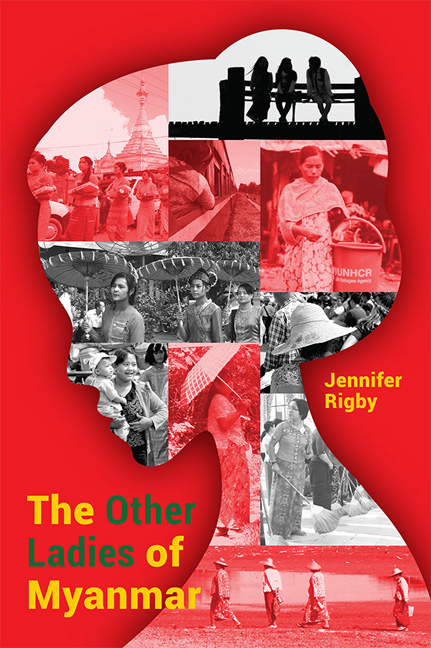Book contents
- Frontmatter
- Dedication
- Contents
- Preface
- Acknowledgements
- Introduction
- Timeline
- 1 The Activist: Cheery Zahau
- 2 The Feminist Buddhist Nun: Ketu Mala
- 3 The Survivor: Mi Mi
- 4 The Businesswoman: Yin Myo Su
- 5 The Environmental Campaigner and Princess: Devi Thant Cin
- 6 The Artist: Ma Ei
- 7 The Refugee Sexual Health Nurse: Mu Tha Paw
- 8 The Rohingya and Human Rights Champion: Wai Wai Nu
- 9 The Farmer: Mar Mar Swe
- 10 The Pop Star: Ah Moon
- 11 The Politician: Htin Htin Htay
- 12 The Archer: Aung Ngeain
- Conclusion
- About the Author
8 - The Rohingya and Human Rights Champion: Wai Wai Nu
Published online by Cambridge University Press: 08 June 2019
- Frontmatter
- Dedication
- Contents
- Preface
- Acknowledgements
- Introduction
- Timeline
- 1 The Activist: Cheery Zahau
- 2 The Feminist Buddhist Nun: Ketu Mala
- 3 The Survivor: Mi Mi
- 4 The Businesswoman: Yin Myo Su
- 5 The Environmental Campaigner and Princess: Devi Thant Cin
- 6 The Artist: Ma Ei
- 7 The Refugee Sexual Health Nurse: Mu Tha Paw
- 8 The Rohingya and Human Rights Champion: Wai Wai Nu
- 9 The Farmer: Mar Mar Swe
- 10 The Pop Star: Ah Moon
- 11 The Politician: Htin Htin Htay
- 12 The Archer: Aung Ngeain
- Conclusion
- About the Author
Summary
IN 2005, when Wai Wai Nu was eighteen, she was arrested and put in prison by Burma's generals for no other reason than that her father was an opposition member of parliament (MP). Unfazed, she sassed the judge and reassured her family even as she was taken behind bars.
When she was released seven years later, undaunted and even inspired by the injustice she had both suffered and seen in jail, she immediately began work as a human rights and women's rights activist.
When I first met her in 2015, she was busy campaigning for equal human rights for all, despite the shadowy presence of Special Branch police officers haunting the events she spoke at.
In short, I think she might be one of the gutsiest people I have ever met.
Now, though — as we talk at the end of 2017 — the thirty-one-yearold is wary. She speaks diplomatically, thoughtfully, and she is obviously worried about the topics we discuss over the phone as she heads to visit her father in hospital in Bangkok.
That's because she is also a Rohingya Muslim, a member of an ethnic group in Myanmar who have been called the most persecuted in the world.
In recent months, an unimaginably brutal campaign of violence against the Rohingya in their home state of Rakhine has seen around 700,000 flee the country.
Thousands have been killed, many of the women gang raped, and hundreds of their home villages burnt by the Burmese army. The UN's top human rights official has said it looks like possible genocide — a genocide that is, almost unthinkably, being overseen by the government of Nobel Peace Prize laureate Aung San Suu Kyi.
For Wai Wai Nu, it's even closer to home. Her eighty-seven-year-old grandma has been displaced by the violence. Her house, land and village have all been destroyed, and she is currently in Buthidaung, a town in Rakhine, because she cannot walk to Bangladesh. She has no one to help her. Wai Wai's family in Myanmar cannot reach her.
“She has lost everything,” says Wai Wai Nu, who struggles to find the words to describe what is happening in Myanmar.
- Type
- Chapter
- Information
- The Other Ladies of Myanmar , pp. 74 - 91Publisher: ISEAS–Yusof Ishak InstitutePrint publication year: 2018



